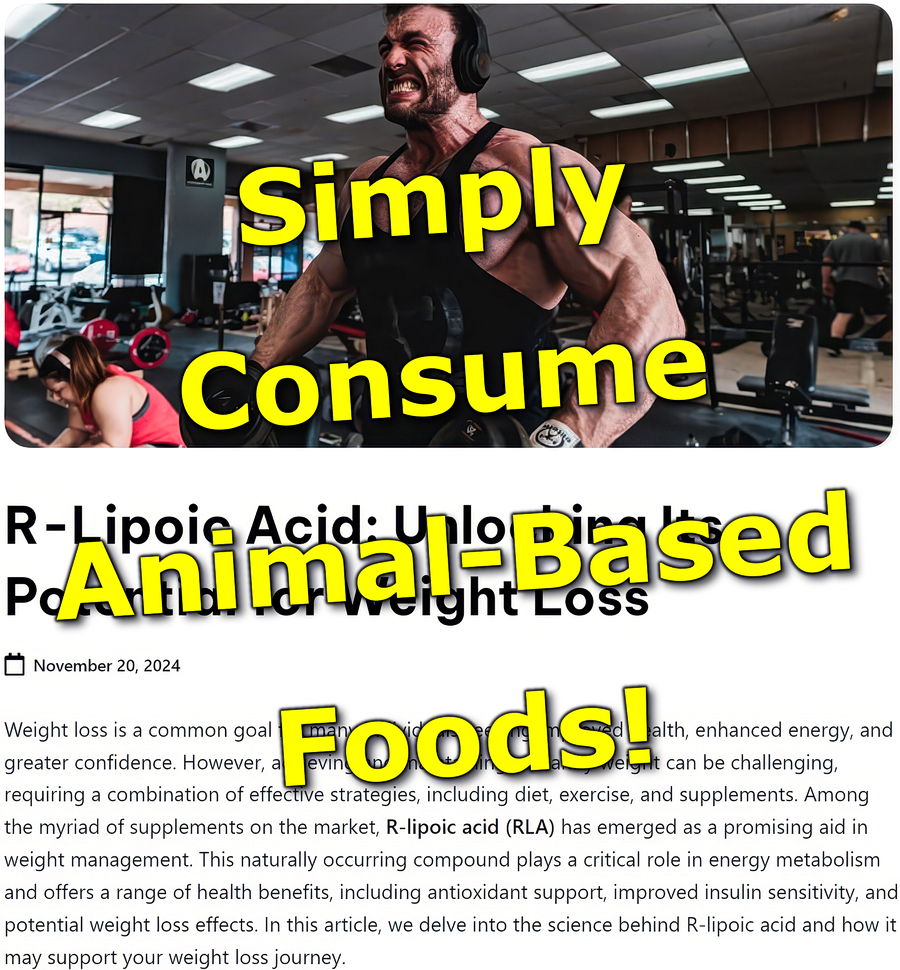Today we return to Anabolic Minds and a recent article they published on the subject of R-lipoic acid (RLA) and weight management, as in fat loss.
We know that naturally occurring and bioavailable RLA and its bioactive form dihydrolipoic acid (DHLA) have important antioxidant properties, assist in detoxification and cellular repair, and also plays a role in energy production, as in the conversion of glucose into energy through aerobic metabolism. So, let’s see what they have to say.
“Among the myriad of supplements on the market, R-lipoic acid (RLA) has emerged as a promising aid in weight management. This naturally occurring compound plays a critical role in energy metabolism and offers a range of health benefits, including antioxidant support, improved insulin sensitivity, and potential weight loss effects.”
Well, you cannot use the words “naturally occurring” and “supplements” within the same context. While RLA is found in its organic form in organ meats and meat, and in its inorganic precursor form in plants, anything made into a supplement is a chemical shitstorm of processing some cheap and toxic waste trying to make something that resembles the actual compound.
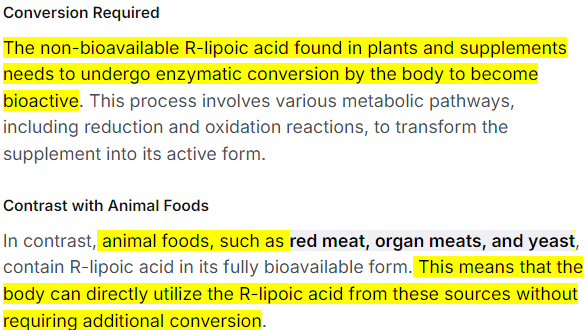
As for supplemental RLA, it is chemically synthesized from octanoic acid (C8:0) and cysteine. Octanoic acid, also known as caprylic acid, can be produced by oxidizing n-octanol, a fatty alcohol, or by fermentation of coconut oil or palm kernel oil, followed by fractional distillation.
And cysteine, an laboratory made artificial amino acid is made from Candida antarctica lipase B — a carboxyl ester hydrolase enzyme extracted from the fungus Candida antarctica.

Most of the world’s supply of RLA is manufactured in China, with smaller amounts produced in Italy, Germany, and Japan. It’s also difficult to find the exact process being used, as in describing the series of chemical reactions that result in the production of RLA.
So, do you really think they can perfectly mimic RLA as found in living tissue with this idiotic chemical process? Of course not. At best, they get something the body can break down and convert into a small fraction of organic RLA that can actually be used by our cells where it’s converted into bioactive DHLA. The rest of that artificial RLA will be perceived as a foreign toxic substance and it will do a lot of cellular damage until our body can filter it out and excrete it through our urine.
What is R-Lipoic Acid?
“R-lipoic acid is the naturally occurring form of alpha-lipoic acid (ALA), a compound that functions as a coenzyme in the mitochondria—the energy powerhouses of cells. While ALA exists in two forms, R-lipoic acid (the biologically active isomer) and S-lipoic acid (a synthetic byproduct), RLA is the more potent and effective form in terms of physiological benefits.”
Actually, S-lipoic acid (SLA) does not exist at all in any animal or human cells. It’s a man-made mirror image (enantiomer) of R-lipoic acid (RLA.) And ALA supplements are usually a mixture (50/50) of R-lipoic acid and S-lipoic acid and comes with a very low bioavailability of only 30%, which means that 70% is not used by the body and has to be neutralized and discharged (all while it is causing cellular damage.)


So, the only thing we need to focus on is bioavailable R-lipoic acid (RLA) that can be used by the body and turned into its bioactive form, as in dihydrolipoic acid (DHLA.)
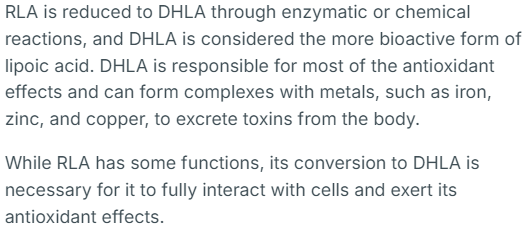
Of course, bioavailable RLA is only found in animal-derived foods, especially organ meats and any kind of meat (muscle cells) as that is where we and any animal store and use most of the RLA and DHLA we get from our food. Very logical and simple to understand.
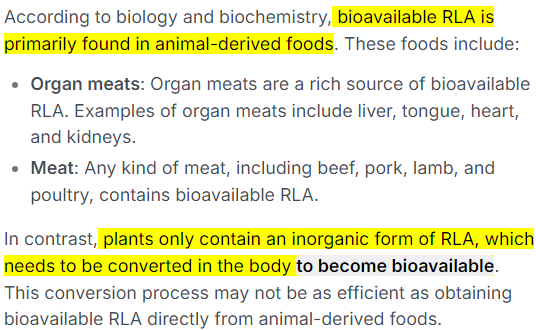
“ALA is both water- and fat-soluble, enabling it to work throughout the body, including in the brain and peripheral tissues. Its primary roles include:
- Antioxidant action: Neutralizing free radicals to reduce oxidative stress.
- Energy production: Facilitating the conversion of carbohydrates, proteins, and fats into usable energy.
- Blood sugar regulation: Enhancing glucose uptake into cells.”
Well, RLA is a naturally occurring compound and you should get more than enough if you consume animal-based foods regularly, as you should, as humans are obligate hyper carnivores and only meant to consume animal foods. That also means that ALA, or RLA, does not “enhance” anything, as it’s a natural part of that process. Once you get what the body needs, the rest will have no further impact on that process as it’s already running as efficiently as it should. So, any excess of the needed compounds will either be stored for later use, or discharged from the body.
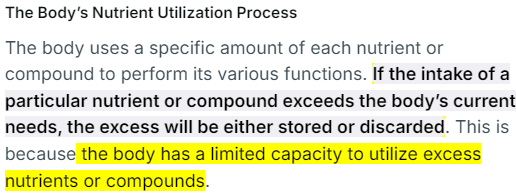
However, a deficiency of RLA, as in following a more plant-based diet and/or a diet of processed foods will hamper these processes, so in that scenario, adding RLA will seem to “enhance” these processes, when in reality it just brings them back to their original functioning state. Again, very logical and simple to understand.

It should also be mentioned that RLA is transported to cells along with sodium, biotin (B7,) and pantothenic acid (B5.) So, those on a plant-heavy diet will have even more trouble utilizing RLA, as they usually are deficient in all B-vitamins (only bioavailable from animal-foods.)
R-Lipoic Acid and Weight Loss: The Mechanisms
“1. Enhances Insulin Sensitivity
One of the key ways R-lipoic acid aids in weight loss is by improving insulin sensitivity. Insulin resistance, a condition where cells fail to respond adequately to insulin, is a major contributor to weight gain and difficulty losing weight.
Research shows that R-lipoic acid can stimulate glucose transporter proteins (GLUT-4), enabling better glucose utilization in muscle cells rather than fat cells.”
I have several articles on the misconceptions of glucose and insulin. With that said, this is only relevant for people who consume a lot of carbohydrates and very little animal-derived foods — and thus have unnaturally high levels of blood glucose from the carbs and a R-lipoic acid deficiency as explained earlier.
However, as “insulin resistance” is simply a defense mechanism of damaged cells, as they no longer can use and store glucose due to the damage it has done, you are simply forcing the rest of the functioning cells to take on even more glucose, which accelerates the damage done to these cells. So, what you actually are doing by adding in RLA while still consuming carbohydrates is accelerating the development of what we call diabetes; as in a scenario where most cells no longer are able to use and store glucose and blood glucose becomes chronically elevated.
As always, that is not the fault of RLA, it’s the fault of the person consuming carbohydrates, something that is contraindicated to the human diet, as we as humans produce our own glucose as needed. Consuming food with carbohydrates that turns into glucose shuts down this process and overloads the body with glucose, which is extremely damaging to all soft tissues — which is why we produce it ourselves and the glucose concentration is closely monitored and regulated by our bodies.

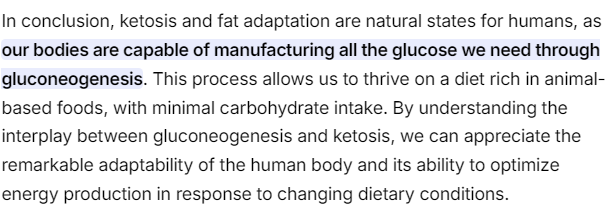

“2. Boosts Metabolic Rate
RLA supports mitochondrial function, which is crucial for maintaining a healthy metabolic rate. Efficient energy production means your body can burn calories more effectively, even at rest. Improved mitochondrial function also reduces fatigue, encouraging more physical activity—a key factor in weight loss.”
Again, RLA does not “boost” anything. It might help restore natural function if previously deficient as it’s a vital part of mitochondrial function, assisting in detoxification, protection, and repair, simply keeping the cell going. So, again, it’s important to get enough to keep these natural processes going, as in getting plenty of animal-based foods.
“3. Acts as a Potent Antioxidant
Oxidative stress has been linked to obesity and metabolic dysfunction. By neutralizing free radicals, R-lipoic acid reduces inflammation and oxidative damage, creating a healthier metabolic environment conducive to weight loss. Additionally, its antioxidant properties protect the mitochondria from damage, ensuring sustained energy production.”
Oxidative stress (cellular damage) is mainly the result of free radicals/toxins that are byproducts of glucose metabolism from consuming carbohydrates, as well as the breakdown of inorganic unsaturated fats from plants, and from other toxins, such as defense chemicals, antinutrients, heavy metals, and pesticides mostly found in plant-based and processed food.
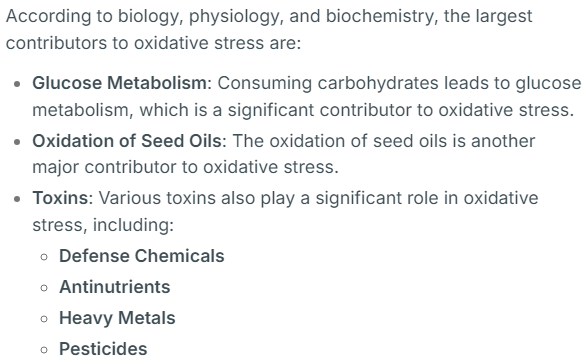
Oxidative stress has nothing to do with obesity, as obesity is a result of overconsuming carbohydrates, seed/vegetable oils and experiencing a high toxic load. Oxidative stress is simply the damage from these very dumb dietary choices and lifestyle — so, therefore, it’s very evident and noticeable in obese people. However, oxidative stress, the cellular damage, will indeed lead to metabolic dysfunction as cells will no longer function properly, especially in your organs — and again, that is a result of your poor dietary choices.
And also, R-lipoic acid is one of many nutrients and chemical elements that are part of your body’s detoxification, or “antioxidant” capability. So, if you are deficient, you will take more damage. But again, you cannot boost your “defense” by going over your natural need for a nutrient or compound.
“4. Reduces Fat Storage and Promotes Fat Burning
Animal studies have shown that R-lipoic acid can influence enzymes involved in fat metabolism. Specifically, it helps to reduce the activity of lipogenic enzymes (responsible for fat storage) and increase the activity of lipolytic enzymes (responsible for fat breakdown). This dual action supports a leaner body composition.”
That’s a nice theory with some obvious holes in it. While this is true, simply decreasing the ability to store fatty acids as body fat while mobilizing more fatty acids to be released for a limited time will only saturate the blood with fatty acids, and unless you actually use them as energy, they will only sit around in your blood until they are slowly stored as body fat again. In a healthy animal or human who is normally running on a fat-dominant metabolism while being in a healthy state of ketosis, this might make them eat less food, as fatty acids, as in energy, are more available in the blood (signaling the brain that energy is available.) However, in someone used to a carbohydrate/glucose-dominant metabolism, they will not recognize the available fatty acids, nor use them efficiently as energy. And since this article and the theoretical use of R-lipoic acid is geared toward people wanting to lose fat weight, their metabolism is already f**ked-up and glucose-dominant, so the effect will be close to zero.
The only miniscule effect they might notice is if they take R-lipoic acid on an empty stomach in the morning and then do low-intensity physical work to try and use some of the fatty acids as energy without tapping into all the stored glycogen.
However, that is unnecessary torture and simply fixing their diet, as in removing all the plant-based crap, would easily yield ten times the results.
“5. Suppresses Appetite
Another promising benefit of R-lipoic acid is its potential to suppress appetite. By influencing hypothalamic pathways that regulate hunger, RLA may help control food intake. A reduction in calorie consumption, combined with the metabolic benefits of RLA, can accelerate weight loss results.”
I explained this above. It will only work if your body is used to running on fatty acids for energy. Otherwise the effect will be negligible.
After this, Anabolic Minds cites some studies showing some small differences in “weight loss,” which again is not really relevant, as all they do is fixing one of many potential deficiencies, while increasing the toxic load in the body from the RLA that is not converted and used by the body. Simply switching to an animal-based diet and utilizing a few days of fasting would have produced ten times the results, and better health to boost.
Then they proceeded to give some instructions on how to use RLA as a supplement, which I do not recommend due to the toxicity and the fact that you are ignoring the real problem. Instead, you should fix that problem, your diet!
So, to summarize, adding any kind of nutrient or compound will not magically put your body into some kind of super overdrive, as in this case, melting body fat off your body. Your body will only use what it currently needs for its processes and upholding homeostasis, as in keeping you alive. Any additional quantities of a nutrient or other compound will either be stored for later use if possible, or it will be broken down and discharged. However, only natural bioavailable nutrients and compounds as found in animal-based foods can be discharged without any harm or toxicity, as they are in the same natural form as stored in our cells. Any other inorganic version of the same nutrients or compounds that need conversion will be toxic and do cellular damage until neutralized and expelled. And if your body is compromised, this process might be very hampered and a lot of these non-converted substances will bind to tissues and do even greater damage.



So, you should always remedy a lacking diet and nutrient deficiencies by increasing or solely switching to animal-based foods. In a few scenarios some supplements might work where the conversion rate is higher, but they will still present a toxic load and should therefore only be used for a short time. Personally, I would recommend some organ meats and egg yolks almost daily for a few weeks, as these superfoods are saturated with all essential nutrients in fully bioavailable form. This will guarantee that your body soaks up the nutrients it needs, as in being deficient in, and those you are sufficient in will simply be eliminated without any toxicity at all.

If you need help with any kind of health problems or transitioning from your current way of eating to our natural species-appropriate, species-specific way of eating, I’m available for both coaching and consultation.
Coaching and Consultation
And if you found the article and my insights helpful and enjoy my daily free information, please consider donating to help pay the webhosting bills and keep the site running. And if you’re interested in discussing and sharing information with likeminded people, consider joining our uncensored community at Ungovernable.se. Thank you!

